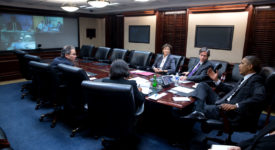As Europe is readying to celebrate the 30th anniversary of the fall of the Berlin Wall, EU member states are expected to spend billions of dollars to improve border security and expand border force, a new study has found. The report coauthored by the Transnational Institute, Centre Dels and Dutch campaign group Stop Wapenhandel (Stop the Arms Trade) has also concluded that the construction of new walls and fences to keep out migrants and refugees are netting billions of dollars for major corporations in the region.
The Iron Curtain may be a distant memory, but European countries have spent at least 900 million euros on land borders since the end of the Cold War, having constructed walls measuring 1,000km, and conducted naval operations that cover a further 4,500km, all while dispensing massive contracts to some of the world’s biggest arms companies. 676.4 million euros have been spent on marine operations from 2006 to 2017 and since 2000 almost one billion euros went for a “virtual wall”, consisting of information and surveillance networks designed to monitor the movement of people.
Perhaps the most high-profile border walls and wire fences were built in 2015 by Hungary, Austria and Slovenia, to deal with the major influx of migrants and refugees entering Europe that year. Also in its next budget, covering the period 2021-2027, the EU has earmarked billions of euros towards the protection of its borders. “The EU is neither an open door nor a fortress,” a European Commission spokesperson explained, adding “what we have been trying to do for the past years is to make the EU borders more secure and better managed. The EU’s aim is not to stop migration, but save lives and protect migrants.”
Meanwhile, the continent’s biggest arms and security suppliers like Italy’s Leonardo and pan-European Airbus or French firm Thales are benefiting from Europe’s increasingly hardline approach to those attempting to enter. While Leonardo supplies helicopters, drones and surveillance technology, Thales provides radar and sensor equipment for ships used by Frontex and develops surveillance infrastructure for Eurosur, and Airbus produces helicopters for land and sea patrols. The report also claims that these European companies take an active part in an aggressive and effective lobbying campaign to convince the EU that migration is not so much a humanitarian crisis but rather a security threat to the Union, which necessitates a militarized response.
Article Categories:
SECURITY & DEFENSE






